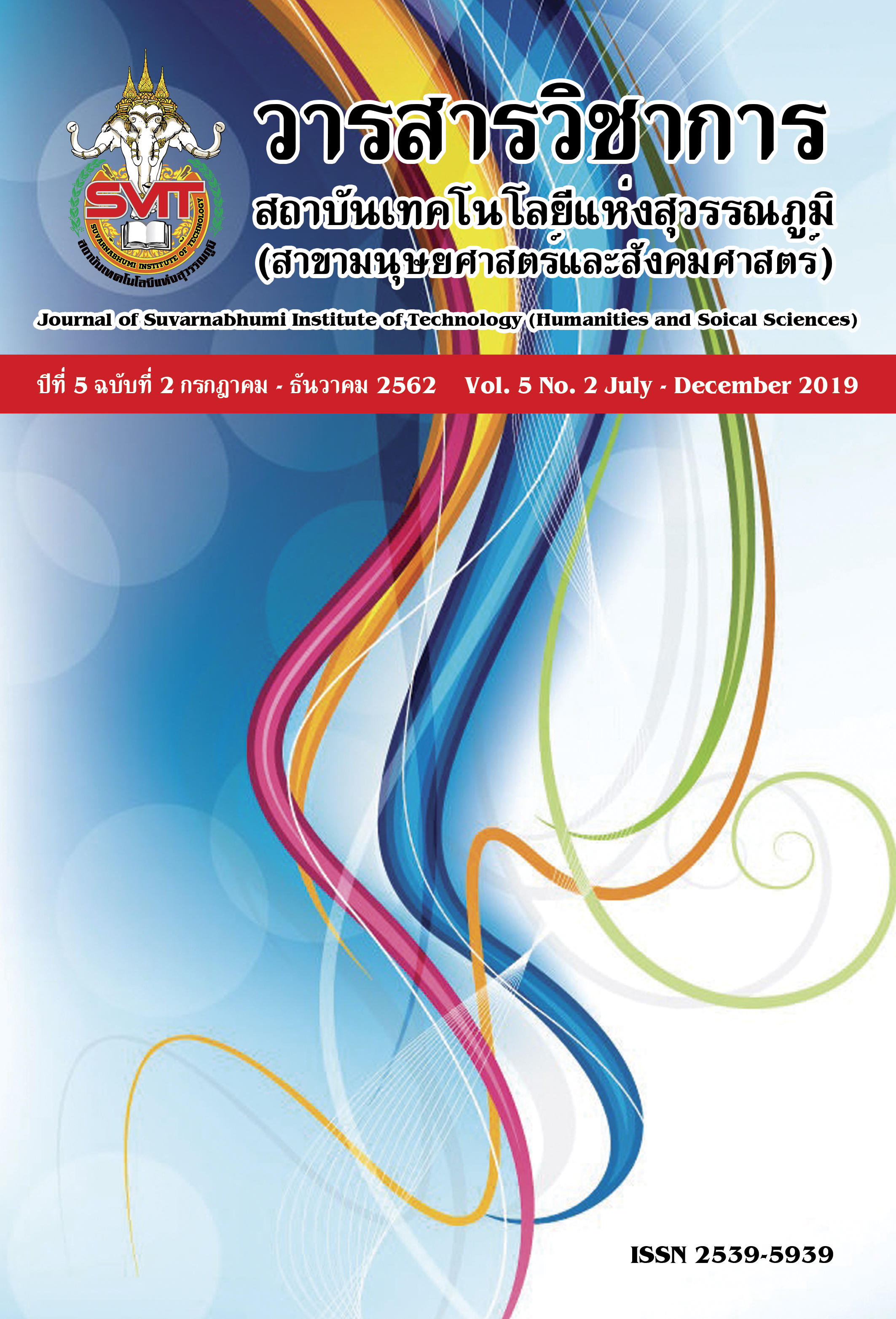THE DEVELOPMENT MODEL OF GASTRONOMIC CITY WITH CREATIVE ECONOMY CONCEPT OF BANGKOK
Keywords:
Development, Creative Economy, Gastronomic City with Creative Economy, BangkokAbstract
This research was a qualitative research in order to reveal the development of gastronomic city in the concept of creative economy in Bangkok. The research and the data collection with the opinions of people who are involved in both academic and practical experience, analysis of readiness, problems and obstacles of Bangkok. In the research, it was found that the context of Bangkok must reflect the uniqueness of community and local. It is a factor in the development of creative economy and sustainable economic value of the community. There are several supporting factors., such as 1. Gastronomy Culture 2. Farm Life Preservation 3. Appropriate Scale Infrastructure: Scale Infrastructure 4. Research Collaborations Training, Testing, etc. Reading to Food5. Education and Awareness-raising of Food Hygiene & Nutrition for Society 6. Governance, leadership & support 7. Food Cluster Development and Business Network 8. Market Expansion for Local Food Targeting for Visitors. Therefore, the food culture of Bangkok, art and culture for a long time in the culture of traditional cooking (Slow Food) is a cooking that focuses on cooking using natural ingredients, without from chemicals and other additives It is the development of food tourism in Bangkok that must make a difference to the food tourism market of other countries.
References
ฐิติกร พูลภัทรชีวิน. (2553). ประเทศไทย...กับความพร้อมในการก้าวสู่เศรษฐกิจสร้างสรรค์. สืบค้นจาก https://sites.google
.com/site/gaiusjustthink/nida-mpa/pa601/download
ปรเมธี วิมลศิริ.(2552). ทำไมต้องเศรษฐกิจสร้างสรรค์. กรุงเทพฯ: บริษัท คอนแทรคท์ พับลิซิ่ง จำกัด.
พิริยะ ผลพิรุฬห์.(2556). เศรษฐกิจสร้างสรรค์กับการพัฒนาประเทศไทย [ข้อมูลทางอิเล็กทรอนิกส์]. วารสารเศรษฐศาสตร์ปริทรรศน์, 7(1) ,1-70. สืบค้นจาก https://tci-thaijo.org/index.php/NER/article/viewFile/22675/19396
สำนักงานคณะกรรมการพัฒนาการเศรษฐกิจและสังคมแห่งชาติ. (2554). แผนพัฒนาเศรษฐกิจและสังคมแห่งชาติฉบับที่ 11 พ.ศ. 2555-2559. สืบค้นจาก https://www.nesdb.go.th/ewt_news.php?nid=5748&filename=
develop_issue
สำนักงานคณะกรรมการพัฒนาการเศรษฐกิจและสังคมแห่งชาติ. (2559). แผนพัฒนาเศรษฐกิจและสังคมแห่งชาติฉบับที่ 12 พ.ศ. 2560-2564. สืบค้นจาก https://www.nesdb.go.th/ewt_dl_link.php?nid=6422
อภิสิทธิ์ ไล่สัตรูไกล. (2552). ทำไมต้องเศรษฐกิจสร้างสรรค์. กรุงเทพฯ: บริษัท คอนแทรคท์ พับลิซิ่ง จำกัด.
ศุภวุฒิ สายเชื้อ. (2552). ทำไมต้องเศรษฐกิจสร้างสรรค์. กรุงเทพฯ: บริษัท คอนแทรคท์ พับลิซิ่ง จำกัด.
ศูนย์วิจัยมหาวิทยาลัยกรุงเทพ.(2555). รัฐบาลยิ่งลักษณ์กับการขับเคลื่อนเศรษฐกิจสร้างสรรค์. [ผลการวิจัย]. สืบค้นจาก https://bangkokpoll.bu.ac.th/poll/result/poll565.php?pollID=424
อนุตรา อึ้งสุประเสริฐ และณัฐพร ศรีศิริรังสิมากุล. (2553). Bangkok City of Gastronomy. คิด Creative Thailand, 1(5), 14-19.
Brokaj, M. (2014). The Impact of the Gastronomic Offer in Choosing Tourism Destination: The Case of Albania [Electronic version]. Academic Journal of Interdisciplinary Studies MCSER Publishing, 3(2), 249-258.
Draskovic, S. (2016). Gastronomy and tourism destination competitiveness, SITCON 2016 - Singidunum International Tourism Conference, 150-154. doi: 10.15308/Sitcon-2016-150-154
Gajic, M. (2012). Gastronomy in Tourism: A Way of Tourism in Growth [Electronic version]. Quaeatus Multidisciplinary Research Journal, 2012(02), 155-166. Retrieved from https://www.quaestus.ro/en/wp-content/uploads/2012/02/gajic.milenko.pdf
Galvez, J.C.P., Lopez-Guzman, T., Buiza, F.C., & Medina-Viruel, M.J. (2017). Gastronomy as an element of attraction in a tourist destination: the case of Lima, Peru, Journal of Ethnic Foods, 4(4), 254-261, Retrieved from https://doi.org/10.1016/j.jef.2017.11.002
Habibah , A., J. Hamzah, A.C.Er., Buang, A., Selvadurai, S., & Mushrifah, I. (2013). City-City Tourism Collaboration in the Straits of Malacca Development Region: Key Success Factors, Asian Social Science, 9(13), 40-52. doi:10.5539/ass.v9n13p40
Lee, A.H., & Wall, G. (2014). Food clusters, rural development and a creative economy [Electronic version], The Journal of Rural and Community Development, 9(4), 1-22.
LeHeup, R. (2015). The Rise of Food Tourism, SKIFT REPORT 2015, Special Report, 1-29. Retrieved from https://www.startup-turismo.it/wp-content/uploads/2016/07/The-Rise-of-Culinary-Tourism-2.pdf
Keane, M. (2555). Thailand International Creative Economy Forum (TICEF 2012) - Grand to Ground: Capturing Local Value, Creating Global Impact. [n.p.].
K-Style Hub.[n.d.]. A New Experience. [n.p.].
Rose, N., & Larsen, K., (2014). Economic Benefits of ‘Creative Food Economies’: Evidence, Case Studies and Actions for Southern Melbourne. VEIL. (2013). Retrieved from https://hdl.handle.net/11343/165207
Sormaz, U., Akmese, H., Gunes, Eda., & Aras, S. (2016). Gastronomy in Tourism, Procedia Economics and Finance, 39(2016), 725 – 730. Retrieved from https://doi.org/10.1016/S2212-5671(16)30286-6
World Bank. (2012). Knowledge Economy Index 2012. [Blog] Retrieved from https://knoema.com/
WBKEI2013/knowledge-economy-index-world-bank-2012
Downloads
Published
Issue
Section
License
The articles published are copyrighted by the Sarasas Journal of Humanities and Social Science. The opinions expressed in each article in this academic journal are those of the individual authors and do not reflect the views of Sarasas Suvarnabhumi Institute of Technology. The authors are solely responsible for all aspects of their respective articles. Any errors or inaccuracies in the articles are the sole responsibility of the authors.



